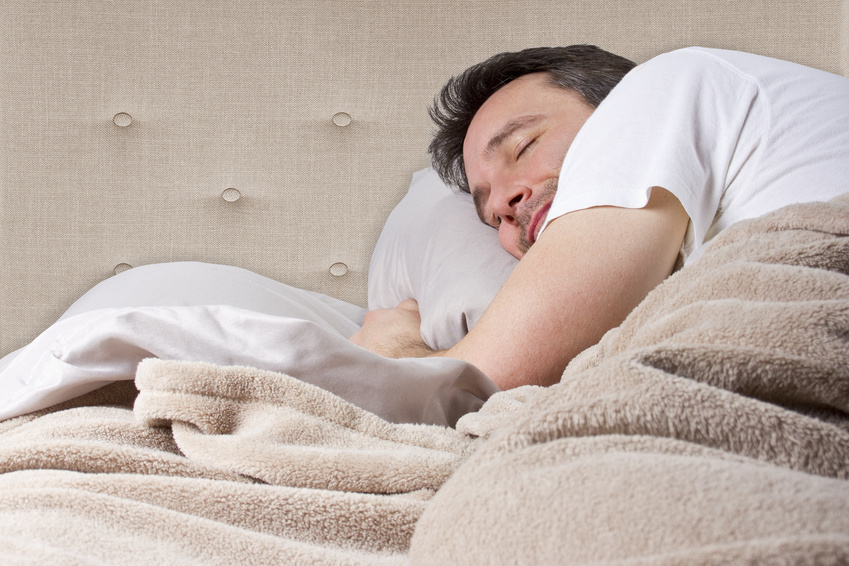 Patients Can Now Get Diagnosed with Sleep Apnea Without an Overnight Stay at the Sleep Lab
Patients Can Now Get Diagnosed with Sleep Apnea Without an Overnight Stay at the Sleep Lab
For many years, the only way you could be diagnosed with sleep apnea was by undergoing a sleep study, also known as a polysomnogram, in a sleep lab setting. But new advances in medical devices have made an accurate sleep study possible from the comfort and convenience of your own bed.
Here’s the scoop about the purpose of polysomnograms, what an at-home sleep study for sleep apnea involves, its advantages over in-lab testing, as well as some scenarios where testing in a sleep lab is the better option.
What is a sleep apnea test or polysomnogram?
A polysomnogram (PSG) is a diagnostic test used to identify obstructive sleep apnea in patients by collecting information during sleep. This information is gathered through small sensors attached to the body that track several different body functions such as breathing patterns, heart rate, the level of oxygen in the blood and limb movements. Traditionally, polysomnograms were always performed in a sleep clinic setting, and many still are, however, new technology has made it possible to get the same accurate data at home.
If you are a chronic snorer or exhibit any of the telltale symptoms of sleep apnea, you may be advised to undergo a polysomnogram to verify whether you are suffering from this sleep disorder. Our national team of eos sleep doctors will only recommend a sleep study if a patient meets certain criteria after performing a thorough examination and getting a full medical history.
What does an at-home sleep study involve?
Your doctor will provide you with a device for the home sleep test. This device will have several sensors that are attached to the body in various places. Each sensor is equipped to measure specific body functions such as breathing rate, airflow and heartbeat. You will be instructed about how to properly apply the sensors and use the test device before you take it home. As you sleep, the device will record data about your sleep behavior that will later be analyzed by a board-certified sleep specialist to make a diagnosis.
What are the advantages of an at-home sleep test for sleep apnea?
Home sleep studies offer numerous advantages, the primary one being the convenience of performing the study from the comfort of your own bed. While many sleep diagnostic centers including the eos sleep diagnostic sleep lab in New York City are designed to provide a soothing, hotel-like atmosphere with all the comforts of home, patients may still find it easier and more appealing to conduct the test in the familiar and private setting of their own bedroom. In addition, at-home tests are significantly less costly than in-lab sleep studies, meaning that both insurance companies and patients may save some money on expenses and out-of-pocket costs.
When should in-lab testing be recommended over a home sleep study?
Home sleep tests are not for everyone. Some patients are not good candidates for this type of diagnostic evaluation because they have symptoms and a medical history that suggests that they have some sleep disorder, but not necessarily sleep apnea. Other sleep disorders may include narcolepsy and restless leg syndrome. A home sleep study will not evaluate for these other conditions, which is why an in-lab test may be recommended for a more thorough evaluation. An eos sleep doctor may also advise against home testing if a patient has other serious medical conditions such as an unstable lung or heart disease. In short, a home sleep study is only an ideal option for those patients who show clear, clinical signs of moderate to severe sleep apnea and do not have other serious health issues.
With the advent of home sleep studies, sleep specialists are optimistic that more patients will feel inclined to seek evaluation for suspected sleep apnea. While the thought of having to spend a night in a sleep lab may have deterred some individuals in the past, the ease and comfort of a home test will hopefully lead to increased diagnoses and treatment for the millions of Americans currently living with this serious sleep disorder.
Find out whether you are a candidate for an easy-to-use home sleep study by scheduling a consultation with an eos sleep doctor today.

 Patients Can Now Get Diagnosed with Sleep Apnea Without an Overnight Stay at the Sleep Lab
Patients Can Now Get Diagnosed with Sleep Apnea Without an Overnight Stay at the Sleep Lab